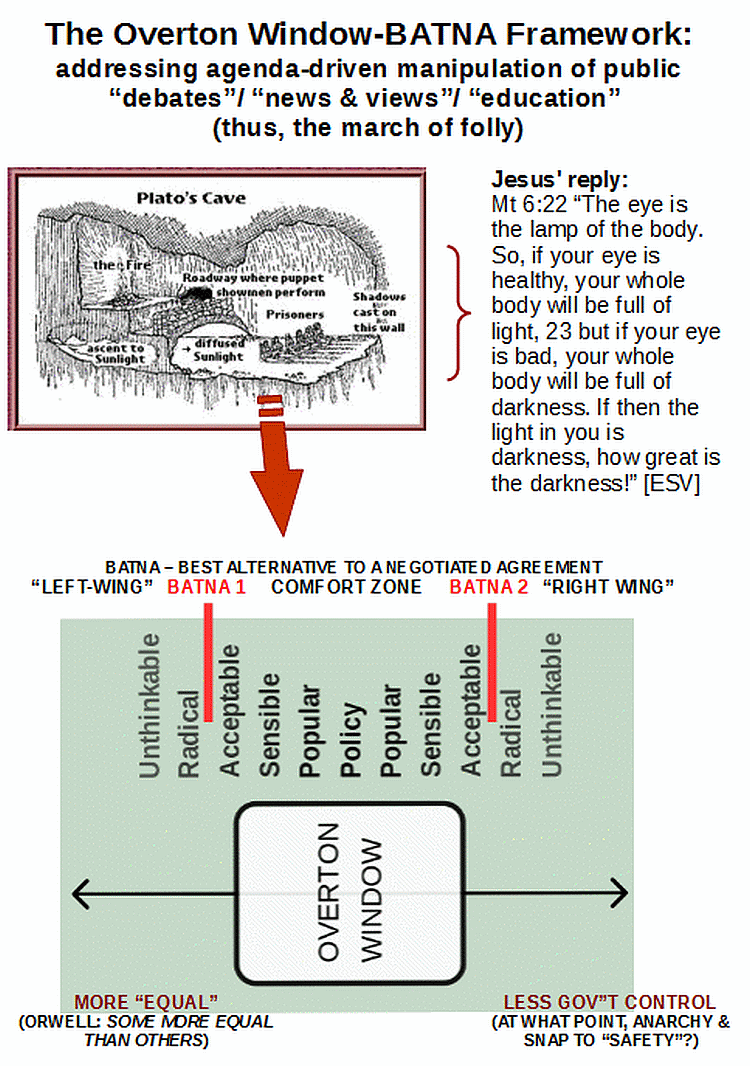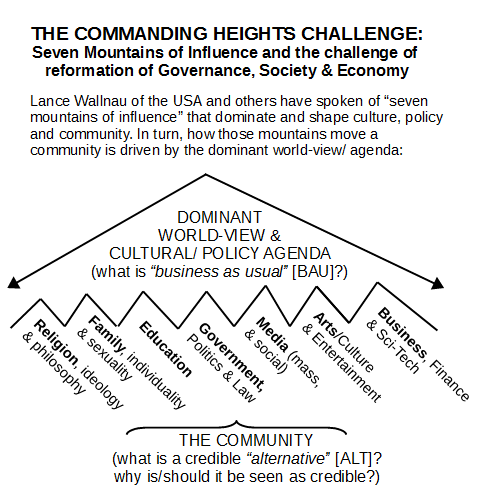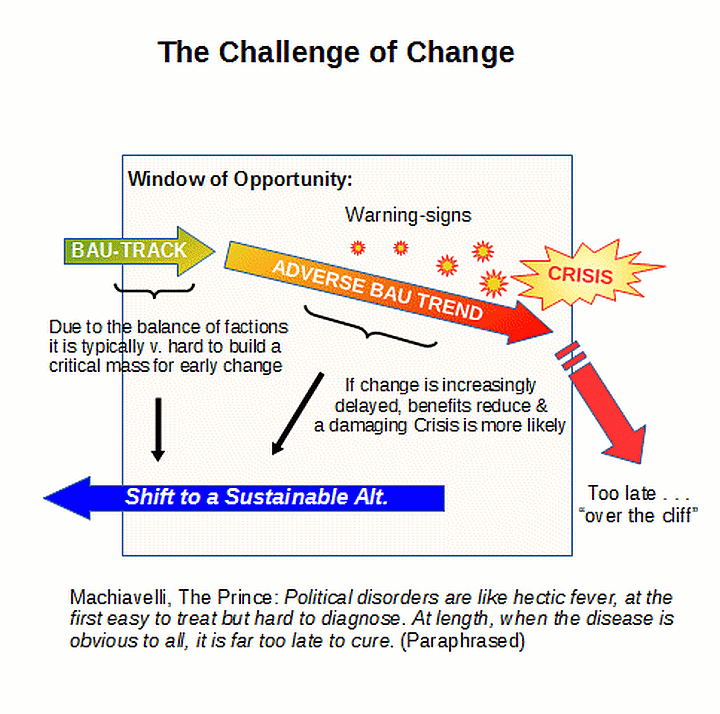In a current WJM thread on transgenderism, CF has been arguing that different cultures and religions take different views and each holds themselves to be superior — of course this overlooks for just one instance a key remark C S Lewis made in his essay, “Men Without Chests” on what he called the Tao, on how uniform core moral principles are across time and place (when we deal with people we accept as equals and/or care about):
>>in early Hinduism that conduct in men which can be called good consists in conformity to, or almost participation in, the Rta — that great ritual or pattern of nature and supernature which is revealed alike in the cosmic order, the moral virtues, and the ceremonial of the temple. Righteousness, correctness, order, the Rta, is constantly identified with satya or truth, correspondence to reality. As Plato said that the Good was ‘beyond existence’ and Wordsworth that through virtue the stars were strong, so the Indian masters say that the gods themselves are born of the Rta and obey it.
The Chinese also speak of a great thing (the greatest thing) called the Tao. It is the reality beyond all predicates, the abyss that was before the Creator Himself. It is Nature, it is the Way, the Road. It is the Way in which the universe goes on, the Way in which things everlastingly emerge, stilly and tranquilly, into space and time. It is also the Way which every man should tread in imitation of that cosmic and supercosmic progression, conforming all activities to that great exemplar. ‘In ritual’, say the Analects, ‘it is harmony with Nature that is prized.’ The ancient Jews likewise praise the Law as being ‘true’.
This conception in all its forms, Platonic, Aristotelian, Stoic, Christian, and Oriental alike, I shall henceforth refer to for brevity simply as ‘the Tao’. Some of the accounts of it which I have quoted will seem, perhaps, to many of you merely quaint or even magical. But what is common to them all is something we cannot neglect. It is the doctrine of objective value, the belief that certain attitudes are really true, and others really false, to the kind of thing the universe is and the kind of things we are. Those who know the Tao can hold that to call children delightful or old men venerable is not simply to record a psychological fact about our own parental or filial emotions at the moment, but to recognize a quality which demands a certain response from us whether we make it or not . . . And because our approvals and disapprovals are thus recognitions of objective value or responses to an objective order, therefore emotional states can be in harmony with reason (when we feel liking for what ought to be approved) or out of harmony with reason (when we perceive that liking is due but cannot feel it). No emotion is, in itself, a judgement; in that sense all emotions and sentiments are alogical. But they can be reasonable or unreasonable as they conform to Reason or fail to conform. The heart never takes the place of the head: but it can, and should, obey it.
Over against this stands the world of The Green Book. In it the very possibility of a sentiment being reasonable—or even unreasonable—has been excluded from the outset. It can be reasonable or unreasonable only if it conforms or fails to conform to something else. To say that the cataract is sublime means saying that our emotion of humility is appropriate or ordinate to the reality, and thus to speak of something else besides the emotion; just as to say that a shoe fits is to speak not only of shoes but of feet. But this reference to something beyond the emotion is what Gaius and Titius exclude from every sentence containing a predicate of value. Such statements, for them, refer solely to the emotion. Now the emotion, thus considered by itself, cannot be either in agreement or disagreement with Reason. It is irrational not as a paralogism is irrational, but as a physical event is irrational: it does not rise even to the dignity of error. On this view, the world of facts, without one trace of value, and the world of feeUngs, without one trace of truth or falsehood, justice or injustice, confront one another, and no rapprochement is possible.
Hence the educational problem is wholly different according as you stand within or without the Tao>>
CF expresses rhetorical surprise to Eugen, at 340:
>>Eugen: “Not expert on this Fish but I think Christian morals demands are high. How much we comply is different story. We all struggle with our sins…”
The subtlety in this, is that “faith” is here evidently viewed as antagonistic to reason and objectivity, especially as it comes up against matters of morality or “values.”
That is already an error, as worldviews must all rest on first plausibles:

I responded, at 341:
>>Pardon some reflections.
The issue is not undue controversy but persistent rhetorical reframing on your part that becomes, with all due respect, fallacious.
Notice how, above, you consistently substitute individual or collective opinion for warranted truth?
(The issue would then be whose might and manipulation prevails, and you are obviously in the lists in favour of the radically relativist, nominalist politically correct “progressivist” views of our day that are keyed to lab coat clad evolutionary materialistic scientism and its fellow travellers.)
I instantly point to the nihilistic implications of such might and manipulation make ‘right’ etc. Yes, a commonplace since Plato trumpeted his warning in The Laws Bk X, 2350 years ago; or at least, such should be a commonplace. (What, you never heard of such before? From one of the top ten thinkers of our civilisation? H’mm, what does that tell us about how dumbed down we have collectively become by being cut off from a true and fair view of the history of key ideas connected to pivotal institutions and issues in our civilisation — the famous seven mountain commanding heights of community life?)
Likewise, I point out that evolutionary materialistic scientism is inherently and irretrievably self-falsifying and lacks a world root level IS capable of bearing the weight of OUGHT. Insofar as its fellow travellers seek to conform to this yardstick, they also will fall under the same problem of measuring truth and right by a yardstick that is based on falsity.
Modelling theory and the logic of implication tell us that a false framework may yield correct results in some cases but will also yield false ones. At crucial points, if we are judging based on imposed falsity we will reject the truth that cuts across such falsity. That would be typical for cases where the truth is somewhat abstract or else where we are dealing with consequences that are not yet realised. (Thus BTW the tendency to dismiss slippery slope cascades of consequences as fallacy without serious examination. Typically, based on being ever so wise in one’s own eyes. Machiavelli warned of the consequences in his remark on political hectic fever. Political disorders, like that fever, are at the first fairly easy to cure but hard to diagnose to the satisfaction of all; but when at length the course of the complaint is manifest to all, it is far too late to cure. That is, the body politic is now unavoidably headed for a crash with reality at the foot of a slippery slope. For want of a nail, the shoe was lost, so the horse, the man and the day of battle in turn; and so the cause was lost. For want of something seemingly so trivial as a nail in a shoe for the horse of just one crucial man carrying a decisive message at a critical point in a battle.)
Truth is far harder and unflinching in its demands: it says of what is that it is, and of what is not, that it is not.
And in cases where truth is not obvious, sound knowledge becomes pivotal. That is, well warranted, credibly true belief. Yes, yet another point where the much despised faith surfaces in reasoning and knowledge. Hence BTW the importance of worldview level analysis in grounding our understanding of ourselves and our world. And the discipline to move beyond rhetorical talking points to warrant anchored at world root level. FYI, debate is that dark art that makes the worse appear the better case and the better the worse, therein supported by rhetoric, the art of persuasion — not sound grounding. Where also, in an age where every man does what is right in his own eyes, it is all too easy for us to be caught up in agendas where we neither discern the goals nor the likely consequences. And it is then quite natural to seek out those who flatter and tickle our ears with what is popular, what we want to hear and imagine is so for we wish it so.
Such . . . sadly . . . is the context of our day — yes, yet another reason to be concerned over marches of folly.
A day in which by contrast a sound person would instead consistently seek to anchor things connected to the civil peace of justice — an inescapably moral context: in the community there is an order that duly balances rights, freedoms and responsibilities in pursuit of the long term good for one and all — to sound, foundational premises. Licence (the self-centred abuse of freedom that refuses to strike the due balance) and lawfare (usurpation of the sword of justice to impose agendas on targets under colour of law) are enemies of the civil peace of justice.
So, no, to divert focus to a clash of opinions on topics of controversy and jump to or rhetorically suggest the implied conclusion that there is no underlying objective basis for decision is a dangerously flawed approach.
Instead, go to the roots.
Are we inescapably governed by OUGHT — yes, even in argument we are forced to understand that we are impelled by the oughtness of truth and avoidance of error and falsity. In the which the guiding impulse is provided by the voice of conscience. Which is a major mental faculty, and which raises the point that to infer or imply that conscience on the whole is delusional about this central message then grand delusion stands let loose in our world of reasoned thought, undermining credibility of mind. In short, we must accept the testimony of conscience on this pivotal matter on pain of absurdity.
We live in a world in which we credibly are responsibly and rationally free, morally governed and so under the rule of OUGHT. The rule of evident core principles of a moral law of our nature. So also, a world in which at world-root level (the bridge cannot be effected at any subsequent level) there must be an IS capable of sustaining the weight of OUGHT. And after centuries of debates, it is clear that there is only one serious candidate: the inherently good creator God, a necessary and maximally great being worthy of our respect, loyalty and the reasonable service of doing the good in accord with our evident nature.
If you would doubt or dismiss this, simply provide a viable alternative: ___________________ (Predictably, you cannot.)
In that context, we can make sense of evil and of sometimes seemingly strange or unappealingly constraining moral rules in that further light. Namely, evil is the privation, frustration, wrenching out of proper end of what is good by nature of creation. So, we may discern the good and right from the bad and evil by its perverse tendencies that will also strongly tend to undermine the good ends that are evident to a reasonable mind. Often, such will not be instantly obvious, it sets up a seemingly attractive but slippery slope that leads to a hard crash with reality.
That is the context of Kant’s categorical imperative: evils use other persons as means to our ends, frustrating or wrenching out of course their proper fulfillment of their natural and good ends. Likewise, evils parasite off the general good, i.e. they profit from being the exception not the rule. Were lying and cheating or thievery and murder to become the rule, damage and harm would spread across the whole community, breaking it down.
This also obtains for the sexual order of our being.
It is quite evident that maleness and femaleness are complementary and are connected inherently to reproduction. Where, sound upbringing of children requires stable, committed families based on lifetime covenant of man and wife, mother and father. Where, families and clans come together in communities to further stabilise and protect this central end of humanity through the civil peace of justice.
When sexual attitudes, thoughts, expressions and behaviours are wrenched out of this context and are twisted away from such ends, it brings ever increasing privation to these ends. That holds for general sexual promiscuity, it holds for the porn plague, it holds for the divorce game, it holds for mass abortion, it holds for the attempts to warp our understanding of the proper use of sex organs under false colour of law and love, it holds for attempts to warp the definition of marriage under colour of law, it holds for the latest agenda item, to warp sense of sexual identity itself, equally under false colour of law.
Nor, can it be fairly, responsibly argued that “my genes MADE me do it.” (That claim, under false colours of science, and spread far and wide by the media and education systems, has done much harm.)
So, it is time to re-think; lest we find ourselves so far down mutually opposed slippery slopes that a hard crash with reality becomes inevitable.
And frankly, I have my doubts that such a crash can now be averted. Too many institutions have become too warped and manipulating.
But maybe we can soften the impact somewhat.
Maybe.>>
Headlined FTR, as food for thought. Onward discussions may continue in WJM’s thread. END
PS: Also cf 308 in the thread. Also 331.



[CF:] I am not suggesting otherwise. I am only saying that we all, regardless of our faith, think that the assemblage of morals espoused by our faith is superior to those of other faiths.
To be completely honest, I didn’t think that this would be controversial. Regardless of our faith, don’t we think that ours is superior (more closely aligning to the truth) than others? If not, why are you Christian and not Muslim, Hindu, Buddist, or Jewish? Assuming, of course, that you are Christian.>>